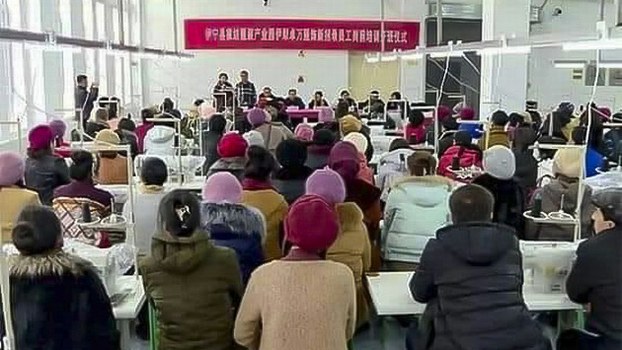New evidence further links a company in northwest China’s Xinjiang Uyghur Autonomous Region (XUAR) whose products were banned from entry to the U.S. earlier this month to forced labor supplied by detainees from a local internment camp.
On Sept. 14, the U.S. Customs and Border Protection (CBP) agency issued Withhold Release Orders (WROs)—measures intended to prevent goods suspected to have been made with forced labor from entering the United States—that targeted three entities from Xinjiang and one from Anhui province in eastern China.
Among the products was apparel produced by Yili Zhuowan Garment Manufacturing Co., Ltd. and Baoding LYSZD Trade and Business Co., Ltd., located in Ghulja (in Chinese, Yining) county, in the XUAR’s Ili Kazakh (Yili Hasake) Autonomous Prefecture.
“Information reasonably indicates that these entities use prison and forced labor in apparel production,” CBP said at the time.
“CBP identified forced labor indicators including the restriction of movement, isolation, intimidation and threats, withholding of wages, and abusive working and living conditions.”
The WROs follow a year of heightened U.S. scrutiny of Beijing’s sprawling network of camps in the XUAR, where authorities are believed to have held up to 1.8 million Uyghurs and other Muslim minorities since April 2017.
And on Tuesday, the U.S. House of Representatives passed the Uyghur Forced Labor Prevention Act that would block imports from the XUAR, amid growing evidence that internment camps in the region have increasingly transitioned from political indoctrination to forced labor, with detainees being sent to work in cotton and textile factories.
Investigations by RFA have found that former detainees placed in forced and coerced labor schemes following their detention are regularly required to surrender part of their pay to camp administrators. In some cases, they are housed in dormitories on their workplace campuses and only permitted to visit their families at home as little as once a month.
In January last year, RFA learned that nine Kazakh women from Ghulja county were sent back to an internment camp after they refused to sign a labor contract with a monthly salary of 600 yuan (U.S. $90), around 40 percent of a typical wage for a manual worker, of which they would have received only around 300 yuan (U.S. $45).
The women had been sent to work in the Jiafang Garments Industrial Park after being released from an internment camp, and expected to work 12-hour shifts sewing gloves and undergo an hour’s “political education” every day for the money.

